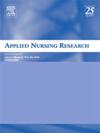癌症护理中的人工智能辅助护理:对疼痛、焦虑和生活质量影响的荟萃分析
IF 2.7
4区 医学
Q1 NURSING
引用次数: 0
摘要
近年来,人工智能(AI)应用已被公认为有效管理癌症患者面临的挑战的支持性技术方法。人工智能应用有望通过加强疼痛和焦虑的管理来改善癌症患者的生活质量(QoL)。目的本研究旨在探讨人工智能辅助护理实践对癌症患者疼痛、焦虑和生活质量的影响。本研究已按照系统评价和荟萃分析(PRISMA) 2020清单的首选报告项目进行准备和报告。方法检索9个数据库和灰色文献的随机对照试验(RCTs),不受年份限制,检索时间自研究成立之日起至2025年1月。meta分析过程采用固定效应和随机效应模型。采用Cochran’s Q卡方检验和I2统计量评估异质性。采用CMA 3软件进行数据分析。结果6项研究(567例患者)纳入本荟萃分析。人工智能辅助护理实践对焦虑有中等和积极的影响(Hedge’s g = 0.46, p <;0.001),疼痛(Hedge’s g = 0.48, p <;0.001),癌症患者也是如此。对肿瘤患者的生活质量有较高的积极影响(Hedge’s g = 1.63, p = 0.020)。结论人工智能辅助护理对癌症患者的疼痛、焦虑和生活质量有显著而有益的影响。人工智能辅助护理实践有可能改善癌症患者的症状和生活质量,这将增强肿瘤护士的意识。本文章由计算机程序翻译,如有差异,请以英文原文为准。
Artificial intelligence-assisted nursing in cancer care: A meta-analysis of its impact on pain, anxiety, and quality of life
Background
In recent years, artificial intelligence (AI) applications have been recognized as a supportive technological method for effectively managing the challenges faced by patients with cancer. AI applications are anticipated to be beneficial in improving the quality of life (QoL) of patients with cancer by enhancing the management of pain and anxiety.
Aim
The aim of this study is to examine the effects of AI-assisted nursing practices on pain, anxiety, and QoL in patients with cancer.
Design
This study has been prepared and reported in accordance with the Preferred Reporting Items for Systematic Reviews and Meta-analyses (PRISMA) 2020 checklist.
Methods
Randomized controlled trials (RCTs) were searched in nine databases and grey literature, without any year restriction, from the inception date until January 2025. Fixed-effect and random-effect models were used in the meta-analysis process. Cochran's Q chi-squared test and I2 statistics were employed to assess heterogeneity. Data analysis was performed using the CMA 3 software.
Results
Six studies (567 patients) were included in this meta-analysis. AI-assisted nursing practices were found to have medium and positive effects on anxiety (Hedge's g = 0.46, p < 0.001), pain (Hedge's g = 0.48, p < 0.001), and in patients with cancer. High and positive effects were found on the QoL of patients with cancer (Hedge's g = 1.63, p = 0.020).
Conclusion
This study reveals that AI-assisted nursing practices have significant and beneficial effects on pain, anxiety, and QoL in patients with cancer.
Implications for practice
AI-assisted nursing practices have the potential to improve cancer patients' symptoms and QoL, which will enhance oncology nurses' awareness.
求助全文
通过发布文献求助,成功后即可免费获取论文全文。
去求助
来源期刊

Applied Nursing Research
医学-护理
CiteScore
4.50
自引率
0.00%
发文量
65
审稿时长
70 days
期刊介绍:
Applied Nursing Research presents original, peer-reviewed research findings clearly and directly for clinical applications in all nursing specialties. Regular features include "Ask the Experts," research briefs, clinical methods, book reviews, news and announcements, and an editorial section. Applied Nursing Research covers such areas as pain management, patient education, discharge planning, nursing diagnosis, job stress in nursing, nursing influence on length of hospital stay, and nurse/physician collaboration.
 求助内容:
求助内容: 应助结果提醒方式:
应助结果提醒方式:


